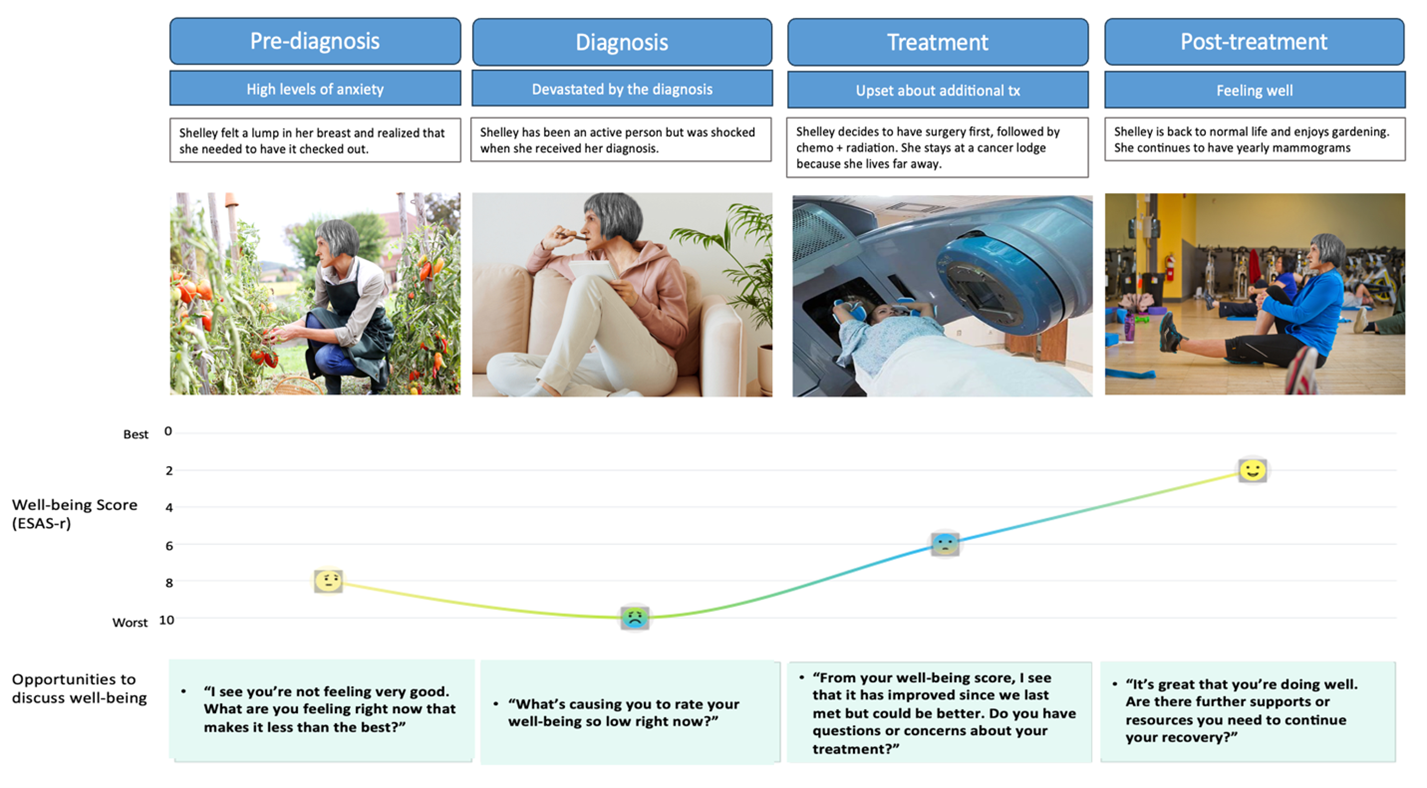Jae-Yung Kwon, PhD RN
University of Victoria
Patient-reported outcome measures (PROMs) assist researchers and clinicians in hearing patients’ voices. However, PROMs lack contextual details and insights into why patients’ health and well-being are improving, deteriorating, or remaining stable over time. My research aims to facilitate the connection between PROMs and patient stories so that clinicians have information about the likely impact of patients’ changing needs while prompting them to dig deeper to get the full story behind PROM scores.
Personas and journey mapping are methods for contextualizing patients’ experiences and stories to provide clinicians with useful information about their feelings, behaviours, and motivations. Personas are hypothetical patient representations that incorporate life stories to help clinicians develop empathy towards the challenges patients face (e.g., by prompting clinicians to consider what their patients are thinking, feeling, and doing during their care). (Watch this video and read our paper for more information on persona development.) Journey maps are visualizations of patients’ life stories over time, assisting clinicians in seeing a patient’s health trajectory (see Figure 1 below).
In our research that will be presented at the ISOQOL 30th Annual Conference, we found that assisting clinicians in incorporating PROMs into practice offers multiple opportunities to improve patient-centred care, as it encourages clinicians to initiate ongoing conversations about patients’ well-being throughout the illness trajectory. For example, during pre-diagnosis, a low PROM score can prompt clinicians to ask the patient, “I see you’re not feeling very good. What are you feeling right now that makes your PROM score less than the best?” (see rest of patient-clinician conversations in Figure 1). These conversations can assist clinicians in better understanding patients’ unique life situations and facilitate better patient-clinician communication to meet the changing needs of patients.
Using PROMs to initiate conversations with patients has the potential to provide more person-centred care, which emphasizes broader social determinants of health and puts patient experiences at the forefront of care. But PROM scores benefit from being contextualized to assist clinicians in better understanding the specific life circumstances patients face that contribute to their symptoms and well-being.
Patient partners in our research first identified the need for more emotional well-being support during the cancer journey. This was supported by the team’s review of the literature, which suggested that older adults often feel their well-being needs are not met while receiving cancer care. This project demonstrates how personas and journey maps can be useful knowledge translation tools to support clinicians’ use of PROM data in practice to assist in meeting these needs during cancer treatment.
Future studies could examine how journey maps could be utilized as part of clinician training for PROM implementation for patients undergoing radiation treatment, including person-centred communication phrases keyed to the different phases during the treatment journey. In addition, personas and journey maps for other routinely collected PROM data could be developed with respect to different treatments (e.g., chemotherapy, surgery) and for patients who have terminal cancer diagnoses.

Figure 1: Shelley’s Journey Map
Abstract will be presented in Friday Poster Session I on Friday, 20 October, 9:35 am – 10:15 am.
This newsletter editorial represents the views of the author and does not necessarily reflect the views of ISOQOL.
How to Submit a Newsletter Editorial
Do you have something to share about health related quality of life and patient-centered outcomes? We want to hear from you!
Learn More

The International Society for Quality of Life Research (ISOQOL) is a global community of researchers, clinicians, health care professionals, industry professionals, consultants, and patient research partners advancing health related quality of life research (HRQL).
Together, we are creating a future in which patient perspective is integral to health research, care and policy.
